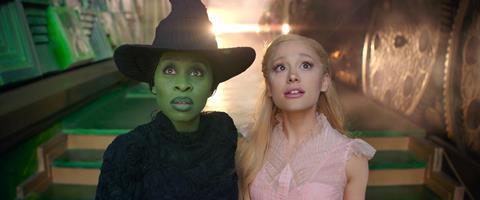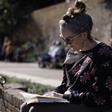Alex Noel says Wicked is: ‘a moral tale about good versus evil - an allegory like so many of our best loved fairytales. And one which grapples with a profound question: ‘Are people born wicked? Or do they have wickedness thrust upon them?’

There’s been a lot of buzz about Wicked, the film adaptation of the long-running hit musical, released in November. It may be a film about witches, but at its heart Wicked is a story about friendship. More so, it’s about a complex friendship between two women, one which swings between loathing and love, acceptance and rejection.
Many will know what that can be like. It’s also a moral tale about good versus evil - an allegory like so many of our best loved fairytales. And one which grapples with a profound question: ‘Are people born wicked? Or do they have wickedness thrust upon them?’ As a Christian that question really intrigues me.
Wicked is essentially their origin story.
Of course, we know these two characters as Glinda the Good Witch and the Wicked Witch of the West, from the classic film The Wizard of Oz. Wicked is essentially their origin story. It turns back the clock to discover how they met - at school, then known as Galinda and Elphaba (played by Ariana Grande and Cynthia Erivo respectively). And the events which shaped who they would become, resulting in a rivalry inseparable from the story of Oz itself.
Beyoncé’s new album ’Cowboy Carter’, calls the shots - this is what Christians can take from it
The timeline starts with the news that the Wicked Witch of the West is dead. Everyone she terrorised is celebrating, including Glinda the Good Witch - who then starts to reminisce. Cue the flashback. In the cinema where I’m watching, there’s an unmistakeable buzz of excitement.
This vision of Oz outshines its many predecessors. Not least for it’s sheer ambition. The film is a technicolor dream, it’s visually dazzling. And it stays true to the 1939 film starring Judy Garland, feeling like a natural evolution, rather than a departure from it. This is the Oz I’d like to wake up in.
Everything packs a punch - from the performances, costumes and production design, to the music - of course.
Everything packs a punch - from the performances, costumes and production design, to the music - of course. It’s intense, and even a little overwhelming. There are brilliant dance numbers and songs, just as you’d expect - they are infectiously fun, sweeping you up. It is undeniably charming too - full of heart and humour. As you’d imagine, the lead actors - both seasoned singers, perform the well-known songs flawlessly, adding their own unique style. Even Jonathan Bailey (as one of the love interests) impresses with his vocal (and dance) skills. The original Broadway leads - Idina Menzel and Kristin Chenoweth - make a welcome appearance too. As well as other stars including Jeff Goldblum and Michelle Yeoh.
But at 2 hours 40 minutes I confess I looked at my watch a few times. While the film makes every effort to remain faithful to the stage show - to the evident delight of its fans, there are some obvious challenges of translating it straight to screen. In this case it felt overly long, and that’s only Part 1. But then, doing any major rewrites would risk losing the people who love it the most.
Girls Aloud are reuniting! What can girl bands show Christian women about friendship?
What it does particularly well is to explore Elphaba’s (the Wicked Witch of the West) trauma and pain. As a child she is mistreated by her family, maligned in favour of her sister and made the family scapegoat - blamed for her sister’s disability. She is shunned and rejected for being born different (“she’s green!”) through no fault of her own. This initially makes her shy and reticent, with a brewing anger and burgeoning power she struggles to control. As her story unfolds you can see how these experiences can take root and shape someone’s identity. As well as an understandable longing for justice not only for herself but others too - namely the animals of Oz who are under threat, and like her are deeply misunderstood.
There is a constant tension. We tread a precarious path with Elphaba between wanting to believe in goodness, and succumbing to the evil that will eventually consume her. I found myself willing her to find healing and wholeness, but it’s hard to come by. Especially when she is manipulated by those who appear to want the best for her, even as she dares to trust them and open up. When she realises they are using her for their own gain, it is crushing. She gives in to what she always feared was true - that she is an outcast who is beyond acceptance. Convinced that she can’t belong, she turns on them.
Review of Cabrini: The inspiring journey of a pioneering nun
It’s a familiar trope - think of Frozen and that defining moment when Elsa embraces her own dark side, believing that it is more freeing to be alone, than to stay and risk further rejection. She gives herself over to her ‘true identity’ which she is unable to fight or undo herself. Imposed on her by others she is burdened with their own unresolved issues and brokenness.
But Elphaba’s sense of triumph and resolve are nonetheless inspiring, even redemptive. When motives are laid bare, she sees them for what they are; empowered to stand up for herself and those who have felt equally oppressed. As she soars away into the distance I longed to feel happy for her, but instead I felt oddly grieved. No doubt she has ‘found herself’ but she is still not at peace. So I’m cautious not to over-identify with her or celebrate her apparent freedom just yet. There’s a lot to this film. Examining these stereotypes of ‘good’ and ‘evil’, by profoundly looking at what made these characters who they are, is Wicked’s brilliance. And it goes to show that everyone has a story, even the witches of Oz.




































No comments yet